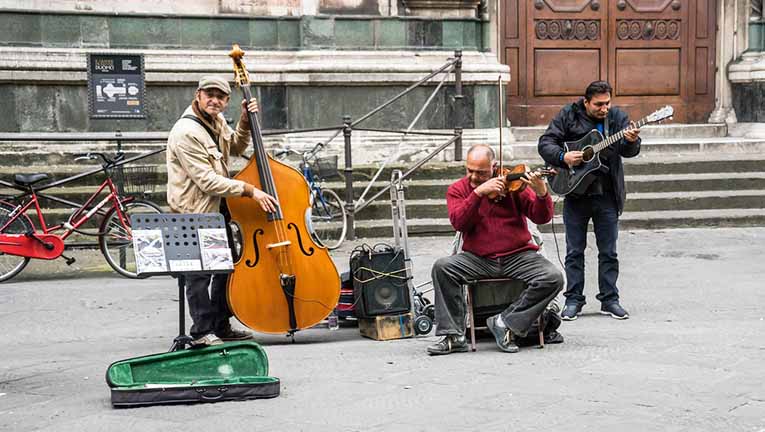You’ve seen so many movies about it, eaten enough pizza, sang along to so many opera songs that you almost feel like you know Italy. It didn’t earn its spot as one of the most popular places for students to study abroad and travel by accident afterall. However, signing up for a study abroad program in Italy requires a commitment to adhering to a very particular set of cultural norms (which can take some serious getting used to).

The bright side is that by being prepared beforehand, your transition into la dolce vita will be much smoother (and more fun!). Your on site program staff are full of wisdom so they will definitely be there to help you when you arrive, but here’s what they wish you knew before arriving in Rome, Florence, Milan, Venice, and any smaller city you can think of for study abroad.
1. You need to know some Italian.
Although a large number of Italians speak a decent amount of English, knowing at least basic Italian can take you far once you arrive in the country. Italians really appreciate non-natives making an effort to speak their language, and even a polite per favore or buongiorno will go a long way with your local vegetable vendor or espresso angel.
2. You should plan to dress appropriately.
One of the hottest topics when discussing Italy is, of course, fashion. Italians treat every day as an occasion to dress up, heels included. If you want to blend in with the locals, avoid sweatpants (those are for home-wear only), invest in some boots (yes, even during the springtime), and add a little more black to your wardrobe. You’ll be cruising through Milan’s fashion district in no time.
Which leads us to our next point...
3. You must pack smart.
To bring or not to bring? Packing (or rather, over-packing) can be a huge challenge when leading up to your semester or summer abroad in Italy. Try to limit how much clothes you bring, as you will inevitably buy souvenirs from all the places you travel and you’ll need space to carry them home! Bring all prescriptions for the months you’ll be abroad, as dealing with Italian healthcare can be tricky, but leave the shampoo and hair dryer at home; you can easily buy those things once you arrive in Italy, and thus avoid the headache of having to purchase plug adaptors, too.

Port Venere
4. You will walk…a lot.
Like most of Europe, Italy is a pedestrian-friendly country; very few people drive personal cars in Italy as they will opt instead to walk 30 minutes across the city instead. Be sure to pack comfortable shoes that you can walk in! If you’re not hitting the pavement, you’ll probably use public transportation, as Italy’s bus and train systems are well-connected and cover the entire peninsula. Make sure you have a map of your city and have glanced at it before you arrive, so you know your way around!
Expert Tip: Bring good shoes to avoid hobbling like an old woman or ruining your heels on the cobblestones.
5. Your smart phone won’t come in handy.
Be prepared to be disconnected from technology! Smartphones aren’t very common in Italy and people don’t rely on technology nearly as much as in the United States or the UK. Although this lack of widespread free Wi-Fi might throw a wrench in your goal of live-tweeting your experience of study abroad in Italy, taking a break from your smartphone and engaging with the world around you offers you endless opportunities to become truly immersed in Italian culture.
Lost and without Google Maps? Just ask a person on the street for directions and see where the conversation takes you!
6. Cash is king!
In Italy, cash is used almost exclusively; not all stores and restaurants in Italy accept credit cards, and those that do might grumble about it. Alert your bank that you’ll be spending time abroad before leaving your home country, and make sure you know your bank’s policy for withdrawing cash internationally. This cash culture actually makes it easier when going out to dinner with a group of friends, as split checks are not common in Italy and chipping in cash as a group is far easier than trying to convince the waiter to take ten credit cards.

St. Peters Basilica
7. Italian-time is real, and you will probably eat dinner at midnight.
Although there are plenty of punctual Italians, Italy tends to run on a different schedule; when someone says they’ll meet you at eight o’clock, it might end up being a quarter after (or maybe even 8:45 p.m.). Similarly, public transportation (especially trains) might operate on a sporadic schedule. While it’s important to allot extra time for the possibility of running behind, don’t be afraid to let go of the rigid schedules you’re used to and just be late sometimes. When in Rome…
8. Don’t be weird about your personal space.
Italians’ concept of personal space differs greatly from that of the United States or the UK, where touching is reserved only for close friends and family. In Italy, it is customary to greet people with two kisses on the cheek, even if it’s the first time meeting them. Italians are also far more apt to “burst your personal bubble,” so to speak, and use physical contact as just one more way to express themselves among their dynamic hand gestures and beautiful language. Don’t be afraid step outside of your comfort zone and give the double-cheek kiss to your new Italian friends, they’ll appreciate the gesture.
9. There are hidden costs you have to watch out for.
Bad news: the water passed out to your table at the restaurant isn’t free, and neither is the basket of bread that came with it.
Throughout all of Italy, charging a coperto (a cover) for a table is standard practice, so don’t be surprised when the bill comes at the end of the meal with a few extra Euro tacked on.
Good news! Italians typically don’t tip their waiters, as they’re paid a decent wage as it is, so you’ll save money that way. Public restrooms, plastic bags at the grocery store, and hostel rooms are other places where there can be hidden charges, so keep an eye out.

Street musicians
10. It’s alllllll worth the challenges.
Although Italy can be a challenging country, it is filled with some of the most interesting history, people, and cultures throughout the entire world. As long as you approach your study abroad experience with an open mind and a willingness to live differently, you’ll have a truly enriching and enjoyable time studying in Italy.
You're ready for study abroad in Italy!
Continue to lean on your on-site study abroad staff for the best insider tips on what’s cool to do in your new town, where to find the best Italian language classes, or which bus line is the most reliable. Then heed their expert advice and hit the ground running.







